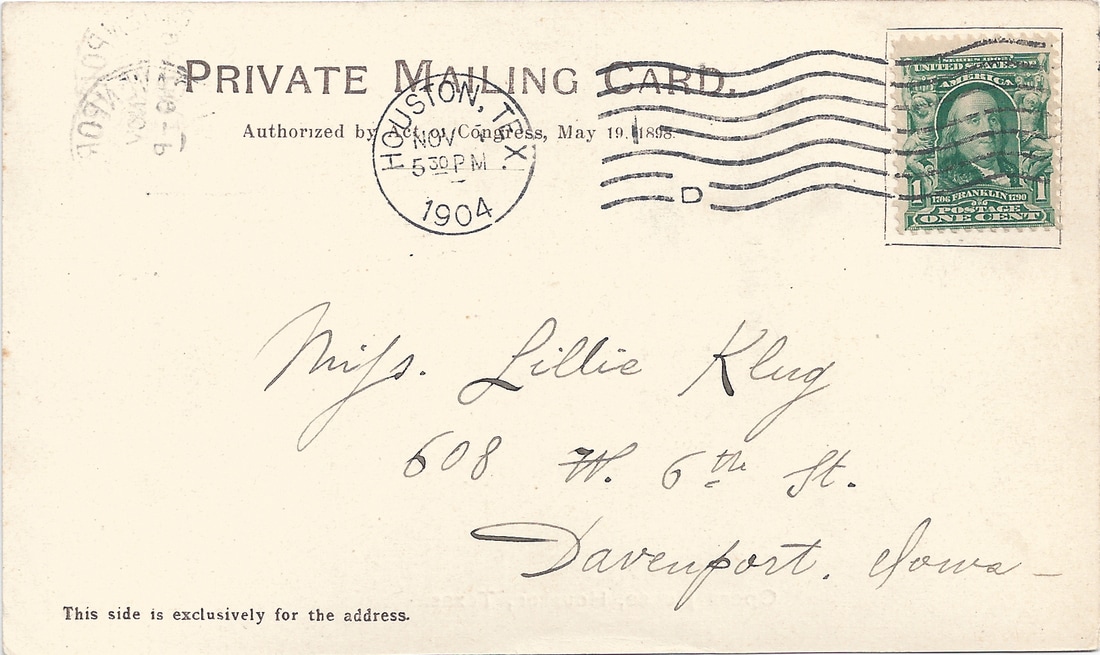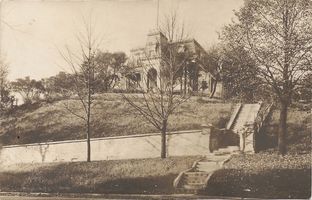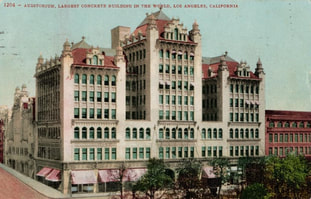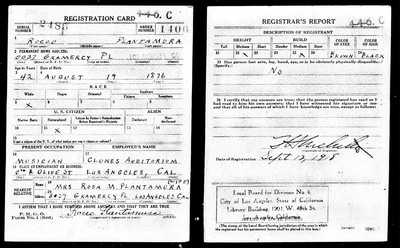Opera House
|
1904: The Opera House was a busy venue where performances such as vaudeville acts, chamber music, and plays could be seen.
|
7 April 2017: Contemporary Houstonians will recognize The Harris County Administration Building at 1001 Preston which sits just across street to the west of the Harris County Court House. This is the bureaucratic labyrinth many of us search out for vehicle title, tax matters and voter registrations.
|
|
To: Miss. Lillie Klug
608 W. 6th St. Davenport. Iowa From: R. Plantamura Message: Nov. 7. 1904 Best Wishes R. Plantamura Postmarked: Houston, Tex. Nov 7 1904 Stamp: 1c Blue Green Benjamn Franklin #300 |
“Best wishes,” R. Plantamura writes on the front of the postcard of the Opera House, and “Nov 7, 1904.” Rocco was a bachelor musician with aspirations, and Lillie was a bit of a dowager heiress from Davenport, Iowa. He may have been looking for sponsorship from a wealthy patroness, or may have hoped for something more. She was about ten years older, the daughter of Otto Klug, a German real estate capitalist who owned numerous downtown blocks of commercial properties. As a young man, Otto had been roused by the 1848 revolution in Europe, and when the reactionaries reasserted their control, came to America to find his freedom here. In Davenport he imported dry goods from Hamburg to sell in his stores, invested his earnings in real estate, and built his fortune before retiring to one of the grandest homes in what is now known as the Hamburg District of the city.
Rocco had immigrated to this country from Acquaviva, South Italy just a couple of years before his postcard. As he wrote, news in Houston was all about the war in East Asia as Japan was defeating Russia at Port Arthur, China [CHECK THIS]. Editorials scared Houstonians with the Yellow Menace, or reassured them about how the Japanese were not barbarians. Early November was election time and local politicians were pushing their platform for the Tuesday election [CHECK]. Theater news was all about Channing Ellery and his Royal Italian Band playing at the Auditorium on McGowan and Main in the south end of the city. Ellery’s band had been touring all across America with a program strong in Verdi. in the months prior, and Lilli may have gone to a concert in Davenport or Chicago, and Rocco may have made her acquaintance there. The Opera House was a grander palace of culture than the more plebeian Auditorium, but Lilli would make her own assumptions about Rocco’s venue. Nothing romantic may have come from Rocco’s note, but in any case by 1904 he had married a Canadian, Agnes Rosa Morton in Chicago and soon moved to Southern California. When WWI came to America, Rocco, even though he was naturalized, affirmed his allegiance to America by registering for the draft. Italy, although a member of Triple Alliance with Germany and Austria-Hungary, eventually entered the war on the side of the Allied Powers. Rocco at the time worked at Clunes Auditorium just off Pershing Square in Los Angeles, the largest and earliest grand cinemas in the western US, playing silent extravaganzas such as “The Clansmen” (later renamed “Birth of a Nation”) and Cleopatra with Theda Bara in a role with thinly disguised Pre-Code nudity. By 1920 Clunes Auditorium became the home of the Los Angeles Philharmonic and the Clunes became Philharmonic Hall. Rocco’s musical talents were employed first as cinema accompaniment, then a trumpeter at the Philharmonic and within a few years he was a respected music professor. Rocco and Rosa Plantamura had a son, Edward F. in 1907 Los Angeles, who worked in music departments for the motion picture industry. Rosa died in 1935, and was buried in Glendale’s Forest Lawn Cemetery, and Rocco married Mary. Rocco himself died in 1954 and was buried beside his first wife. His grandson, Edward Anthony carried on the family tradition as a musician, and like Rocco, was a brass player. Lillie, one of 7 children, never married, and as her sisters and brother moved away, Lillie stayed at the family home. Otto, Sr. died in 1899, Otto, Jr. in 1912 and Lillie’s mother Friederica died in 1913. Lillie stayed on as manager of their considerable estate, and became a legendary spinster in her nearly empty mansion for decades. She died in 1957 and the mansion became a boarding house until it was razed in 1968 after a fire. |





